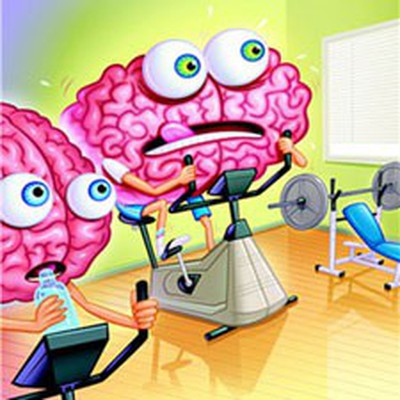The Brain-Body Connection: Can Exercise Really Make Our Brains Work Better?
Abstract
"Use it or lose it!" Sure, we all know physical exercise is important to keeping our bodies fit. But how important is physical exercise to your brain? In other words, is there any connection between an active body and increased brain power? This is an easy project where you can test the effect of exercise on a critical brain function: memory.Summary
Darlene E. Jenkins, Ph.D., Science Buddies

Objective
The goal of this project is to determine the effect of exercise on a critical brain function: memory.Introduction
Couch potatoes beware. Research now suggests that a sedentary lifestyle negatively impacts our brain as well as our body. Regular exercise appears critical for keeping our brain cells fit and functioning. Studies show that exercise stimulates nerve cells to produce chemicals called neurotrophic factors that act like "fertilizer" for the brain. These proteins encourage brain cells to grow and to connect with other neurons. Other chemicals like adrenaline and noradrenaline are triggered during aerobic workouts and, at least in the short run, wake up the brain's processing systems.
Scientists think active bodies could mean improved mental focus, better decision making, faster healing time for patients with nerve or brain injuries, and reduced risk of dementia as we age. Brain scans of older volunteers, for example, indicate that the outer layer (gray matter) of certain areas of the brain, the frontal, temporal, and parietal cortexes, showed less decline in active seniors than in those who didn't exercise.
Imagine an experiment designed to test the effect of physical activity on memory. You could recruit some volunteers to participate in a study. Half of them could hang out and play board games for ten minutes. The other half could spend ten minutes completing an exercise obstacle course. Next, all the volunteers could be brought together to perform an easy memory test where they wrote down all the objects they could recall after a quick look at 25 household items you have selected ahead of time. Then, compared these scores to those from a similar memory test taken by the volunteers before they played games or exercised. What results do you think you would get if you tried this experiment?
Whether you decide to try this study or try to design one yourself, we've written down the basic steps of the experimental procedure to get you started. We've also included a short list of Terms, Concepts, and Questions to research before you start your project in order to get some background on the topic of exercise and its effect on memory. In addition, we've added some suggestions for variations and other related projects to consider. Who knows, maybe you'll come up with some amazing results of your own.
So, good luck. Get those friends moving (or not), and see if you discover a Brain-Body Connection!
Terms and Concepts
To do this project, you should do research that enables you to understand the following terms and concepts:
- Exercise
- Sedentary lifestyles
- Memory
- Brain cortex
- Neurotrophic factors
Questions
Here are some questions for more advanced background research:- How does exercise affect memory?
- What are some chemical changes that occur in the brain/body during exercise?
- What are the effects of exercise on mood, decision making, or reaction times?
- How does exercise influence the aging process?
Bibliography
Here are some websites to check out as you start your research:- The site includes basic brain anatomy and function along with interactive puzzles.
Bragdon, A. D. (n.d.). The Brainwaves Center: A Fun and Informative Way to Exercise the Mind. Retrieved April 20, 2007. - Summary of studies describing physical and molecular changes of the brain following exercise:
Brownlee, C. (2006, February 25). Buff and Brainy: Exercising the Body Can Benefit the Brain. Science News, Feb 25; Vol. 169, No. 8. Retrieved March 11, 2015. - Report on brain aging at the National Institute on Aging:
Elias, M. (2005). Want a Sharp Mind for Your Golden Years? Start Now. USA Today. Aug 17, 2005. Retrieved April 20, 2007.
Materials and Equipment
To do this experiment you will need the following materials and equipment:- Minimum eight volunteers
- 50 small household items (25 items for the practice test and 25 for the real test)
- Table to put the items on
- Towel to cover up the items
- An obstacle course, or have your friends run around the block, do jumping jacks, skip rope, etc.
- Board games
- Tables and chairs
- Paper or notepad
- Pencils or pens
- Watch or timer
Experimental Procedure
- Design your exercise obstacle course or decide on which aerobic activities you will ask your volunteers to do for ten minutes.
- Collect a few popular board games and set up the tables and chairs. Place the items for the each memory test on a table and cover each set with a towel.
- Explain the overall procedures to your volunteers.
- Have them take the initial memory test with the first set of items.
- Remove the towel and let the volunteers study the table for one minute.
- Cover the items again and ask each volunteer to write down as many of the items as they can remember in three minutes.
- Collect the answer sheets so you can tally the correct scores for each volunteer.
- Randomly assign each volunteer to one of two equal-sized experimental groups: one exercise group, and one board games group A good way to do this is to have your test subjects blindly select marked pieces of paper from a hat or bowl.
- Each group should perform their assigned activity for ten minutes. Be sure to record the start and stop times.
- Have the groups quickly gather and repeat the memory test with the second set of household items.
- Collect the answer sheets and total the number of correct items on each sheet to record scores for each person in the first and second memory tests.
Analyze Your Data
- Make a table to show how each volunteer's score may have changed before and after their activity.
| Volunteer # | Group | Test 1 Score | Test 2 Score | Score Change Test 2 Score - Test 1 Score) |
|---|---|---|---|---|
- You can also compute the average score for each group for memory tests one and two, and the average score change.
- Make bar graphs showing the individual participant's scores as well as each group's average.
- Questions to consider:
- Do you see any differences in scores before and after each person did their assigned activity for ten minutes?
- Do the group averages indicate that exercise may have had an effect on memory scores?
Ask an Expert
Global Connections
The United Nations Sustainable Development Goals (UNSDGs) are a blueprint to achieve a better and more sustainable future for all.
Variations
- Repeat the experiment and have the teams switch roles before doing a third memory test. In other words, the group that played board games gets to try a fresh memory test after ten minutes of exercise, and the group that exercised gets to sit down and play board games before another memory test.
- Repeat the study on a second day in case some of the participants were just extra tired or not feeling too great the day they were tested. Compare the results of the two days to see if they are the same or different.
- One of the participants in a previous version of this study claimed that she didn't do as well as she could on the memory test because she was still thinking about the board game she had been playing. How about trying a more restful or less mentally challenging activity than playing board games. Can you think of more calming or less strenuous things they could do for ten minutes besides playing board games?
- Do you think more exercise time would have a greater impact on memory? Try the experiment with activity times greater than ten minutes. How about 20 or 30 minutes? Is there a maximum time that exercise should be done before the memory test? Design experiments to test these ideas.
- How about an experiment to look at the effects of long-term exercise over several weeks or months? You could chart your or your volunteers' physical activity over time and compare the results of memory tests taken every few weeks.
- Are there other mental activities you could test for besides memory? Consider mood, math or reading skills, reaction times, video game scores, etc.
- Does the age of the volunteer make any difference? You might try a similar study with volunteers who are much older (55+) and then compare the results with those you obtained with your friends.
- Are there other factors than exercise that might contribute to a good memory? Would diet, hours of sleep each night, or music influence how well someone's brain may function? Design an experiment to find out.
- Does background noise influence how well people study and remember what they are learning? Do students complete assignments better in a silent room or when music is playing or the TV is on? Design an experiment to find out.
- For a related experiment on exercise and heart health, see Science Buddies project Heart Health: How Does Heart Rate Change with Exercise?
Careers
If you like this project, you might enjoy exploring these related careers:











